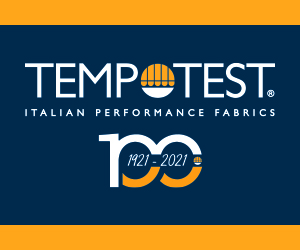Magni is Ready to Revive Whitehead
August 7, 2002
Cape Town, South Africa - Stefano Magni''s finish in four hours and 20 minutes at this year''s ''Argus Cycle Tour'' was not his best. But he finished while others didn''t. Two younger men, 33 and 38 years old, both had heart attacks in the 100-degree heat during the 109 km race this March. Magni has competed in the last 11 Argus events, showing a consistency of effort that he may need now more than ever as chairman of Whitehead Fabrics Ltd.
Magni and his brother Andrea, 56, acquired David Whitehead, a weaver, dyer, printer and finisher last year after it had been registering substantial losses for four years. They bought it for peanuts - less than the R30 million asking price by Tongaat Hulett, a sugar company that started Whitehead in the 1960s as a diversification move. Tired of the textile business, Hulett went back to its roots as a sugar producer two years ago and had been trying to sell Whitehead ever since. The Magnis were the only bidders. Most feel it will take more than peanuts to make Whitehead successful.
The company has already weathered one labor strike since the acquisition. And Whitehead and the South African Clothing and Textile Worker''s Union have been locked in negotiations since April over wage costs and conditions of employment.
''Whitehead...aims to gradually reduce its wage costs to approximate the industry norm,'' Magni said. But the current negotiations are also linked to Whitehead''s plan to increase its output from 19 million meters a year to its top production capacity of 25 million meters by mid-2003 as part of its turnaround strategy.
Magni said the company would not retrench any workers providing production was stepped up to increase output and current union negotiations were successfully concluded. In further efforts to get back on track, the company has employed a top textile designer, Susan Alcock from Stuart Graham International, and is investing more than R20 million in new equipment this year to improve product quality and increase production efficiency.
Currently standing at $34 million in sales of about 24 million meters a year of jacquard wovens, color wovens, plain and piece-dyed fabrics, Magni feels that Whitehead could potentially double sales in five years.
''The company is also planning to add more value to its products by increasing its ready-made curtaining and bedding output,'' Magni said. He has gone on record recently saying that globalization dictates more export (about 20 percent of production is exported to Northern Europe and the U.K., Australia and Asia), and this move is expected to help increase exports to 25 percent by the end of 2002. ''We will build Whitehead stronger in bedding, furnishings and curtains. Keep in mind that Whitehead is 65 percent apparel-oriented. We intend to bring back the home textiles portion of the business to a higher level-to where it belongs.'' In spite of all the changes to boost design and production, Magni plans business as usual on the management end. ''Whitehead had a great foundation. We kept on most of the management but hired a new managing director in Ben Vermooten,'' Magni said. Vermooten is considered to be a good accountant, but time will tell if he''s in over his head, as some believe.
Magni''s gut feeling is that the South African textile industry is in the beginning of a resurgence, helped by the premiere edition of Living Space, a textile exposition held in March. ''The South African textile industry is becoming more competitive. Our imports from Pakistan, China and India are down. About 70 percent of the cost of textiles is dollar-based. The rand was worth 2.5 to the dollar in 1990 and in 2002, it''s about 12 to the dollar. The inflation rate has been less than half of the devaluation,'' he said.
Until this acquisition, the Magnis'' only textile holding was the Aranda blanket mill, run by cousin Nicola. Started by Magnis'' uncle in 1953 when the Magni family migrated to South Africa from Italy, Aranda produces three million blankets a year for the South African market. The blankets are made on the woolens system with Italian looms. Magni wants to double the home furnishings business with some joint cooperation with Aranda on the export side.
Magni and his brother are the fourth generation of Magnis to be in the textile business started by his great grandfather in Italy in 1860, but no one else can run this race for them. Combining family history with a positive outlook on the business climate of South Africa, they believe they''re up to the challenge.
''This is the biggest venture of our lives. We''re very positive on this country of South Africa,'' said Magni. His optimism may give him needed energy for the marathon ahead. F&FI
Magni and his brother Andrea, 56, acquired David Whitehead, a weaver, dyer, printer and finisher last year after it had been registering substantial losses for four years. They bought it for peanuts - less than the R30 million asking price by Tongaat Hulett, a sugar company that started Whitehead in the 1960s as a diversification move. Tired of the textile business, Hulett went back to its roots as a sugar producer two years ago and had been trying to sell Whitehead ever since. The Magnis were the only bidders. Most feel it will take more than peanuts to make Whitehead successful.
The company has already weathered one labor strike since the acquisition. And Whitehead and the South African Clothing and Textile Worker''s Union have been locked in negotiations since April over wage costs and conditions of employment.
''Whitehead...aims to gradually reduce its wage costs to approximate the industry norm,'' Magni said. But the current negotiations are also linked to Whitehead''s plan to increase its output from 19 million meters a year to its top production capacity of 25 million meters by mid-2003 as part of its turnaround strategy.
Magni said the company would not retrench any workers providing production was stepped up to increase output and current union negotiations were successfully concluded. In further efforts to get back on track, the company has employed a top textile designer, Susan Alcock from Stuart Graham International, and is investing more than R20 million in new equipment this year to improve product quality and increase production efficiency.
Currently standing at $34 million in sales of about 24 million meters a year of jacquard wovens, color wovens, plain and piece-dyed fabrics, Magni feels that Whitehead could potentially double sales in five years.
''The company is also planning to add more value to its products by increasing its ready-made curtaining and bedding output,'' Magni said. He has gone on record recently saying that globalization dictates more export (about 20 percent of production is exported to Northern Europe and the U.K., Australia and Asia), and this move is expected to help increase exports to 25 percent by the end of 2002. ''We will build Whitehead stronger in bedding, furnishings and curtains. Keep in mind that Whitehead is 65 percent apparel-oriented. We intend to bring back the home textiles portion of the business to a higher level-to where it belongs.'' In spite of all the changes to boost design and production, Magni plans business as usual on the management end. ''Whitehead had a great foundation. We kept on most of the management but hired a new managing director in Ben Vermooten,'' Magni said. Vermooten is considered to be a good accountant, but time will tell if he''s in over his head, as some believe.
Magni''s gut feeling is that the South African textile industry is in the beginning of a resurgence, helped by the premiere edition of Living Space, a textile exposition held in March. ''The South African textile industry is becoming more competitive. Our imports from Pakistan, China and India are down. About 70 percent of the cost of textiles is dollar-based. The rand was worth 2.5 to the dollar in 1990 and in 2002, it''s about 12 to the dollar. The inflation rate has been less than half of the devaluation,'' he said.
Until this acquisition, the Magnis'' only textile holding was the Aranda blanket mill, run by cousin Nicola. Started by Magnis'' uncle in 1953 when the Magni family migrated to South Africa from Italy, Aranda produces three million blankets a year for the South African market. The blankets are made on the woolens system with Italian looms. Magni wants to double the home furnishings business with some joint cooperation with Aranda on the export side.
Magni and his brother are the fourth generation of Magnis to be in the textile business started by his great grandfather in Italy in 1860, but no one else can run this race for them. Combining family history with a positive outlook on the business climate of South Africa, they believe they''re up to the challenge.
''This is the biggest venture of our lives. We''re very positive on this country of South Africa,'' said Magni. His optimism may give him needed energy for the marathon ahead. F&FI
















